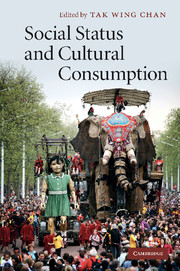Book contents
- Frontmatter
- Contents
- List of figures
- List of tables
- List of contributors
- Acknowledgments
- 1 Social status and cultural consumption
- 2 The social status scale: its construction and properties
- 3 Social stratification and musical consumption: highbrow–middlebrow in the United States
- 4 Bourdieu's legacy and the class–status debate on cultural consumption: musical consumption in contemporary France
- 5 Social status and public cultural consumption: Chile in comparative perspective
- 6 Social stratification and cultural participation in Hungary: a post-communist pattern of consumption?
- 7 Status, class and culture in the Netherlands
- 8 Social stratification of cultural consumption across three domains: music; theatre, dance and cinema; and the visual arts
- 9 Conclusion
- References
- Index
5 - Social status and public cultural consumption: Chile in comparative perspective
Published online by Cambridge University Press: 07 May 2010
- Frontmatter
- Contents
- List of figures
- List of tables
- List of contributors
- Acknowledgments
- 1 Social status and cultural consumption
- 2 The social status scale: its construction and properties
- 3 Social stratification and musical consumption: highbrow–middlebrow in the United States
- 4 Bourdieu's legacy and the class–status debate on cultural consumption: musical consumption in contemporary France
- 5 Social status and public cultural consumption: Chile in comparative perspective
- 6 Social stratification and cultural participation in Hungary: a post-communist pattern of consumption?
- 7 Status, class and culture in the Netherlands
- 8 Social stratification of cultural consumption across three domains: music; theatre, dance and cinema; and the visual arts
- 9 Conclusion
- References
- Index
Summary
Introduction
This chapter studies the stratification of cultural consumption in Chile, that which takes place in public space rather than at home. In particular, it explores whether individual status position affects cultural consumption patterns, net of other measures of socioeconomic advantage such as education, income or class. Status is understood in the Weberian sense as an intersubjective evaluation of social superiority, equality and inferiority (Weber, 1946, pp. 186–88; Chan and Goldthorpe, 2004), which expresses itself doubly in patterns of intimate association such as marriage and friendship, and in shared lifestyles (Weber, 1968, p. 306). These two dimensions of status distinctions provide an internal sense of social solidarity (horizontal integration) and a way to express difference from others (vertical differentiation) (DiMaggio, 1994).
Status distinctions are constructed in explicit opposition to pure market relations. Even though similar economic positions can lead to the formation of status groups, status membership rejects ‘the pretensions of sheer property’ (Weber, 1968, p. 932; Scott, 1996, pp. 32–33). If a status order exists, it should have a substantial effect on cultural consumption, as the latter usually expresses lifestyle distinctions. In order to test this hypothesis I empirically construct a status order based on the marriage patterns of occupational incumbents in Chile and test if status expresses itself in cultural consumption patterns.
Much research on the social basis of cultural consumption, with its focus on the three hypotheses of homology, omnivore–univore and individualisation, has been confined to a few industrialised nations.
- Type
- Chapter
- Information
- Social Status and Cultural Consumption , pp. 109 - 138Publisher: Cambridge University PressPrint publication year: 2010
- 7
- Cited by



